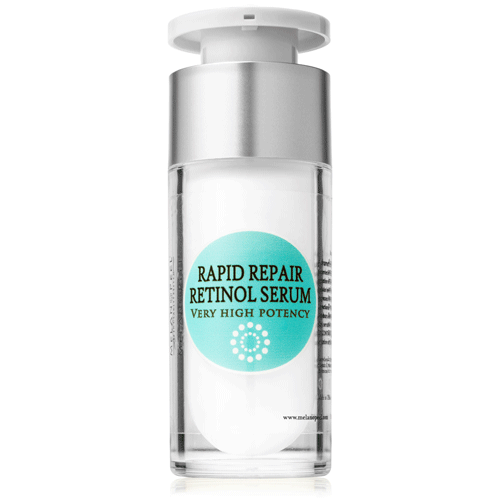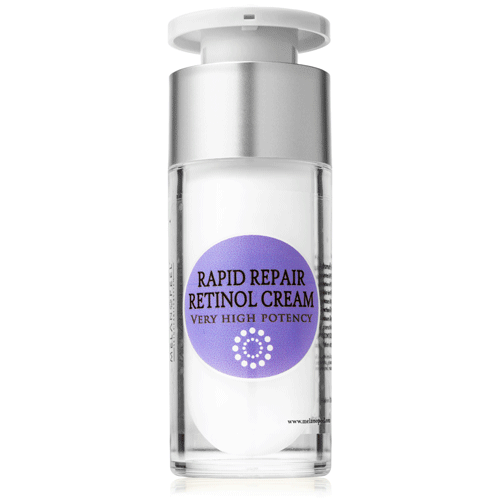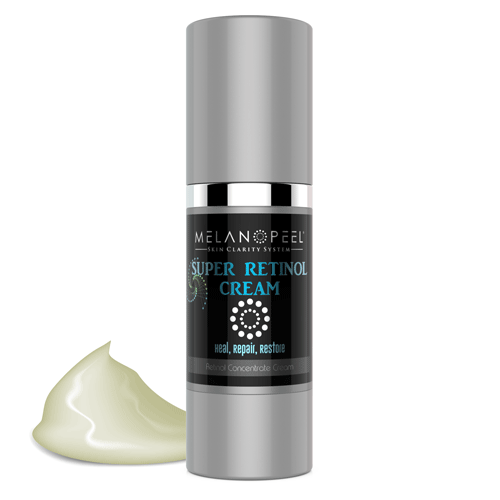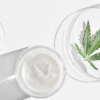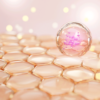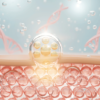Retinol and retinoids are a group of active molecules derived from vitamin A. There is a conversion pathway where retinol converts to retinoids, which are the real work horses of skin transformation.
The next question should be – why not just use retinoids such as tretinoin (tretinoin = Retin-A) as they are the true active weapons? The answer to that is simple – retinoids are a prescription medication with higher levels of skin irritation while retinols are non-prescription with less skin irritation.
Both are effective, although your retinols need to be chosen carefully since they will not all be equally effective.
The effects of retinol and retinoids on the skin:
These vitamin A-derived molecules have metabolism pathways in the skin, and are easy to penetrate and bind to skin receptors. The list of effects on the skin are numerous as seen below. Nearly every cellular process needed for healthy skin can be modified by these amazing compounds.
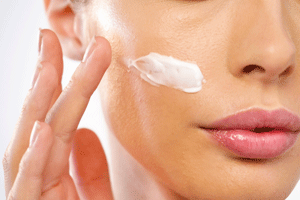
- They normalize the renewal cycle of epidermal cells. As one gets older, or with acne patients, the outer skin cells become sluggish and outer cells accumulate. Both retinoids and retinols are able to speed up the skin cycle and remove excess dead skin cells. This is the reason why they can be recommended for both acne & antiaging. This is also the reason why your skin flakes off faster.
- By speeding up the removal of dead and damaged skin cells from the surface, pigmented cells flake off helping your skin to become lighter and clearer.
- They stimulate the formation of healthy skin cells by being selective against DNA damaged cells. This is the reason why retinoids are used for anti-aging, sun damaged skin, and persons with precancerous actinic ketatosis.
- They aid faster skin healing. Persons undergoing more invasive skin treatments like chemical peels and microneedling find that their physician prescribes a retinol-based cream to speed up the healing process.
- Stimulation of the layer where new cells are born makes the deeper skin layers of the dermis produce more collagen, hyaluronic acid, and become firmer and more elastic.
- They down-regulate oil production of the sebaceous glands. This is the reason why retinoids and retinols are recommended for oily skin.
- They increase production of nutrient-supplying capillaries to the skin. This is one of the reasons why the skin becomes temporarily redder and rosier when you begin use. This is often mistaken for an allergic reaction, especially since the skin has also temporarily become more sensitive. Your skin is now being shocked into behaving in a more normal manner.
When would you need a prescription retinoid:
- More severe acne, aging and sun damage. Faster and more intense skin changes are required in these cases to help normalize the skin.
- Other indications not related to aesthetic dermatology include psoriasis and precancerous skin lesions. The most widely prescribed retinoid is tretinoin, under the brand name of Retin-A.
When would you need a retinol:
- Mild to moderate acne and sun damage. The Melanopeel® range of high potency (HP) retinols are capable of producing significant changes in skin quality and texture with regular use. Click here to learn more about the effectiveness of our HP retinols.
- Patients with more sensitive skin, including patients with rosacea.
- Patients using a range of other skin-altering active products such as hydroxy acids and skin lighteners for cosmetic complexion changes.
- Teenagers.
Skin conditions that can be improved with retinoids & retinol:
- Acne
- Oily skin
- Sun damage
- Aging skin
- Pigmented skin
Retinols and retinoids should not be used when pregnant or nursing. Sun screen protection should be used with strong retinols and prescription retinoids.


